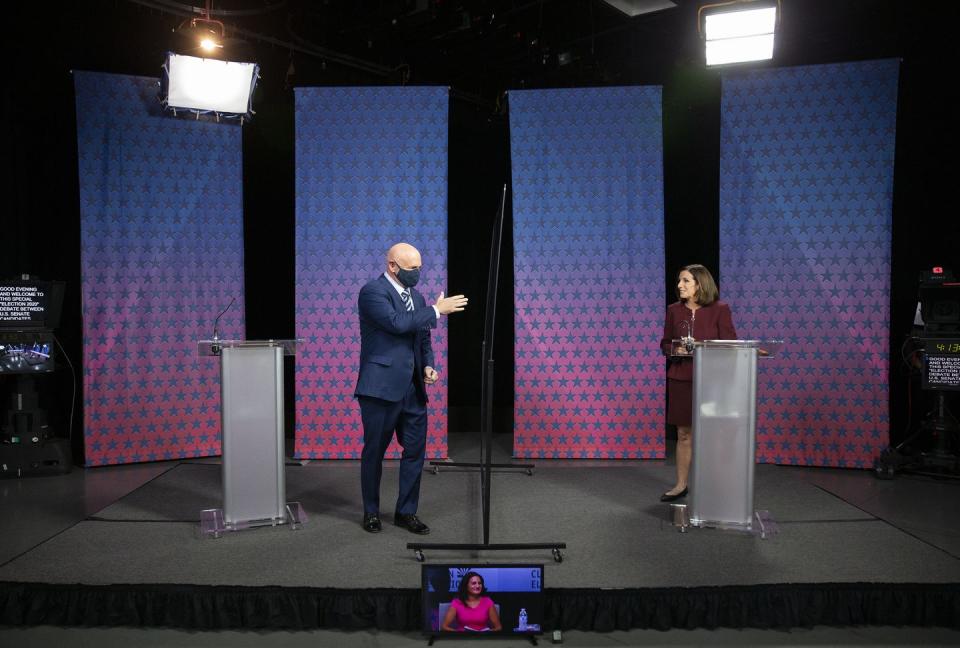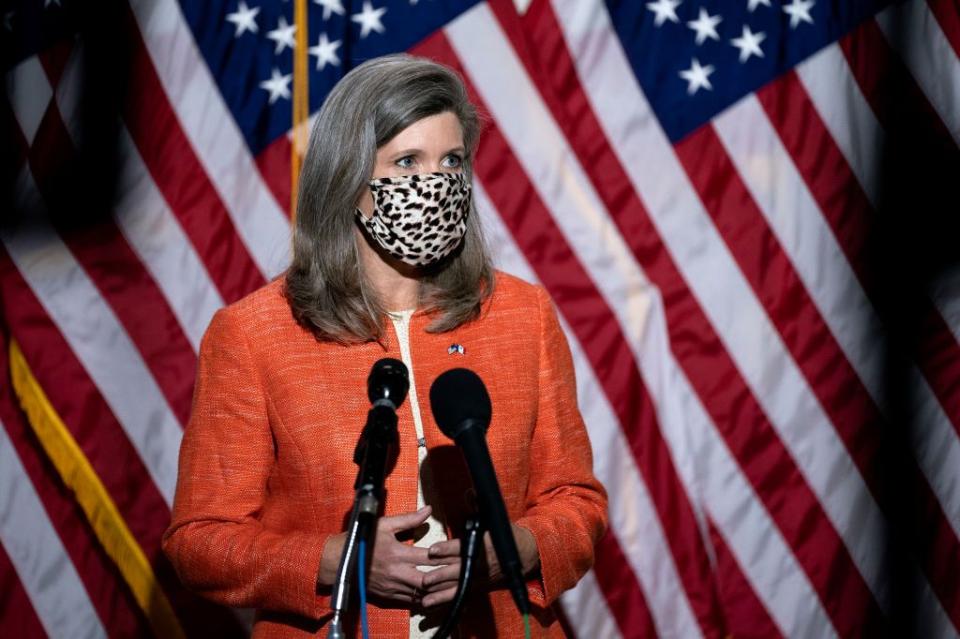Your Reproductive Rights Could Depend on Your Down-Ballot Votes This Election

The November 3 presidential election is almost upon us, and the main focus this fall seems to be on whether we will have four more years of Donald Trump or the first female vice president in American history. Your vote for president is extremely important this year, but here's something you shouldn't overlook: the rest of the candidates on the ballot in your state.
Down-ballot voting, also called "down-ticket voting," refers to all the offices listed below that of president and vice president. This includes any senators or house representatives in your state as well as gubernatorial candidates, attorneys general, secretaries of state, lieutenant governors, and other executive offices, such as treasurer and auditor.
And as we creep closer to election day, those offices have become even more crucial for those passionate about issues, including but not limited to protecting reproductive rights. Following the September 19 death of former Supreme Court Justice Ruth Bader Ginsburg, President Trump has nominated Amy Coney Barrett, who has written openly about her anti-choice stance. During her confirmation hearings, Barrett did not directly answer the question regarding whether she agrees Roe v. Wade was "wrongly decided" in 1973.
"I completely understand why you are asking the question," Barrett said. "But I can’t pre-commit or say, 'Yes, I'm going in with some agenda,' because I'm not. I don't have any agenda."
With the fate of Roe v. Wade in question, another thing to keep in mind is that several states in the U.S. have already made significant cutbacks to abortion rights. Ten states— Arkansas, Idaho, Kentucky, Louisiana, Mississippi, North Dakota, Missouri, Tennessee, South Dakota, and Utah—already have what are known as "trigger laws," which would automatically make abortion illegal should Roe be overturned. In 2019, state legislatures passed 25 abortion bans, varying in severity, across 12 states.
The Senate is in charge of confirming justices to the highest court in the land, and many senators are from states with those trigger laws and bans. Although it definitely matters who is representing you in the Senate, it's just as—if not more—important to consider who is on the ballot for your state legislature. When it comes to reproductive rights, for example, it can be up to the leaders in your state to push for protections.

When there are pro-choice advocates at the state level, reproductive rights in your state will be covered, no matter what happens at the national level. For example, in 2019, New York Gov. Andrew Cuomo signed into law the Reproductive Health Act, which codified Roe. v. Wade into New York state law.
The above reasons are why, when you go to the polls, or drop off your mail-in ballot, you should make your local election a priority.
"Right now, what's top of mind for so many voters is kicking Donald Trump out of office," Amanda Matos, director of constituency campaigns at Planned Parenthood Votes, told ELLE.com on a phone call. "And yes, Planned Parenthood advocacy and political organizations are moving voters to kick Donald Trump out, but what's important and what we're also doing is focusing attention to voting up and down ballot...It's really state politicians, including governors and state legislators, that actually have the most impact on our ability to access or even be denied essential reproductive healthcare. So the way I view it is that electing reproductive health champions up and down the ballot actually creates critical backstops regardless of what might be happening in Washington, D.C."
Here's a guide for who—and what—to look out for on your ballot.
Key Senate races:
Alabama
Democrat Doug Jones is in a race against Republican Tommy Tuberville. In 2017, Jones won in a special election against Republican Roy Moore, who was accused of sexual misconduct by women when they were teenagers. Jones won the special election by small margin, and his chances this time around are slim, too. An early October poll from Auburn University at Montgomery had Tuberville in a 54 percent lead over Jones's 42 percent.
Alabama is an aggressive state when it comes to anti-abortion legislation. As of this September, several restrictions are in place, including that insurance under the Affordable Care Act will only cover the procedure in in the case of "life endangerment, rape, or incest," per Guttmacher.
In October of last year, an Alabama judge blocked the "The Alabama Human Life Protection Act," which would be a near-total ban on abortion in the state. Jones, who as the Montgomery Advertiser notes, has, in the past, "broken with abortion rights supporters," doesn't have the same strict anti-abortion views as Moore and believes that the best way to reduce the abortion rate in his state is to "improve the quality of life and economic outlook for women." He's voted with NARAL Pro-Choice America's positions 69 percent of the time, as of 2019.
He referred to the nomination of Amy Coney Barrett as "nothing more than a torpedo fired by the Trump administration to blow up the Affordable Care Act."
Arizona
This is a big one to watch. Mark Kelly, a Democrat and the husband of former Congresswoman Gabby Giffords, is running against Sen. Martha McSally, a Republican. He stands firmly with protecting abortion rights; McSally voted to appeal the ACA and block patients' access to Planned Parenthood centers. Per The New York Times, Kelly could be sworn in as a senator as early as November 30, which means he could be in the Senate before the rest of his new colleagues in January—a potential plus for the Dems.
"Regardless of who wins, once the vote is certified here in Arizona, in accordance with the law, that person should be promptly seated to work for Arizonans," Kelly said on ABC's The View. "They're concerned about health care, pre-existing conditions. They're concerned about protecting Social Security and Medicare. So in accordance with the law, when the election is done, I think it's important that if I was to win that I get sworn."
Arizona's governor Doug Ducey is a "proudly pro-life" Republican, but he's up for reelection in 2022. Voting in a senator who supports progressive reproductive-health legislation can only be a step in a positive direction.

Colorado
The Colorado incumbent, Sen. Cory Gardner, is considered to be in a vulnerable position this election. The latest polls for this race show that the Democratic candidate, John Hickenlooper, is leading by 10 percent. Gardner votes in line with Trump's position 89.1 percent of the time. In July he declined to say whether he supports or opposes Trump's mission to overturn the ACA.
The Denver Post noted in March of last year that Hickenlooper "is a supporter of abortion rights. However, it has never been a defining issue for him."
Maine
Susan Collins, a Republican, has been representing the Senate in Maine since 1997. For years, she was known as a moderate Republican who worked with her colleagues across the aisle. But, in recent years, she has grown increasingly conservative. As Rebecca Traister wrote in New York magazine in February, she has largely lost her "moderate" status among voters.
Per FiveThirtyEight, Collins has voted in line with President Trump 67.5 percent of the time, perhaps most notably in 2018, when she was the deciding vote to confirm Supreme Court Justice Brett Kavanaugh, which some Americans found surprising.
As of October 15, Democratic candidate Sara Gideon was leading Collins in the poll by seven points. Although Collins has said she will vote "no" to confirm Barrett before the election, many of her defectors are still not convinced she's the independent she once claimed to be.

Georgia
This election alone is a reason to pay attention to down-ballot races this year. Both Georgia Senate seats are up for grabs this year, which means this could be a real opportunity for Democrats. Right now, there is a 53-47 Republican majority in the Senate, and these two Senate spots will definitely narrow that gap. As Bloomberg noted, Sen. David Perdue, the incumbent, is running against Democrat Jon Ossoff, and they're effectively tied right now.
Republican Kelly Loeffler, who was appointed by Georgia's governor, Brian Kemp, last December to replace Republican Johnny Isakson, is running for voter approval to finish out the final two years of Isakson's term. Democrat Raphael Warnock is vying for Loeffler's seat. The Cook Political Report has declared the race for Loeffler's Senate spot to be a toss up.
Georgia is also one of the toughest states on abortion. In May 2019, Gov. Brian Kemp signed into law a "heartbeat bill," which would ban abortion if a fetal heartbeat is detected.
Iowa
Republican Sen. Joni Ernst is up for reelection, running against Democrat Theresa Greenfield, who is leading her by five percentage points in recent polls. Ernst has a record of voting with Trump 91.1 percent of the time. In 2017, Trump signed into law legislation that was backed by Ernst and Diane Black (TN-R), which restored Title X decisions to the state level.
"I am pleased that President Trump signed our legislation into law, and I'm grateful to have worked with Congressman Black to ensure that states are not forced to provide entities like Planned Parenthood—the nation's single largest provider of abortions—with federal Title X dollars," she wrote in 2017.
Title X is a federal program that serves low-income residents, and when Trump instituted a gag rule on the program in 2019, it threatened more than 3,500 clinics that received Title X funds.

Michigan
During the week of October 12, a poll from The New York Times and Siena College found that incumbent Sen. Gary Peters only leads Republican candidate John James by one point. As Vox pointed out, Peters is only one of two Democratic senators running for reelection in a state where Trump won in 2016 (the other is Jones in Alabama).
James has spoken out about his strict views against abortion and has been criticized by abortion activists in his state for doing so. In 2018, he was recorded saying the following at a campaign event in Lansing, Michigan: "They want to do away with our children—50 million dead since Roe v. Wade. That's unacceptable. I have to recount, not to anybody in this room or anybody in Washington, but with the Lord. I want to hear seven words: 'Well done my good and faithful servant.' Standing by and letting this genocide continue stands in the way of that happening."
Montana
This is an election that has received a good deal of national attention. Incumbent Sen. Steve Daines is running against Steve Bullock, the Democrat currently serving in his second term as governor for Montana. At the last minute in March, he announced that he would run against Daines, which as the Great Falls Tribune reported, changed Daines's chances for a smooth run to victory. The Cook Report moved this race from a Republican "lean" to a "toss up."
This is another race that the Democrats will be looking to clinch as they hope to flip the Senate. Daines has been outspoken on his anti-choice views and was the founder of the "Senate pro-life caucus."

North Carolina
Democratic challenger Cal Cunningham is still leading incumbent, Republican Sen. Thom Tillis, in the polls, despite Cunningham's sexting scandal earlier this month. As of now, North Carolina has an anti-choice Congress. In March, NARAL endorsed Cunningham in the election.
"Senator Tillis is one of Donald Trump's biggest cheerleaders in the Senate, and North Carolinians simply can't afford to spend another six years paying the price for his and Trump’s extreme agenda, which includes placing politicians in the middle of people’s personal decisions about pregnancy," NARAL wrote then.
Tillis has voted in line with Trump's position 93.4 percent of the time.
South Carolina
Sen. Lindsey Graham is in his third term as a Republican senator in South Carolina and is running for a fourth against Democrat Jaime Harrison. At this point, Graham is leading Harrison in the polls, but as both candidates break fundraising records, this race remains one to watch.
Graham has a history of anti-abortion opinions and in 2020, he re-introduced the Pain-Capable Unborn Child Protection Act, which would ban abortion after 20 weeks. He has sponsored the bill every year since 2013.
Gubernatorial elections to watch:
Missouri
Democrat Nicole Galloway, Missouri's state auditor, is running against Republican incumbent Jim Parson, who became governor in 2018 after Eric Greitens resigned during an extramarital affair scandal and allegations of campaign-finance allegations. Recent polls show Parson in the lead.
Before Parson took office, Missouri already had restrictive abortion legislation, including a 72-hour waiting period pushed through by the Republican-controlled legislature in 2014. In May of 2019, Parson who has said he wants to make Missouri "the most Pro-Life state in the country," signed a bill that criminalizes abortions after eight weeks.
As ABC News reported, abortion is "expected to play a key role" in Missouri's 2020 governor's race. Galloway has called Parson's eight-week law "outrageous." Political-science experts in the state told ABC that Missouri's strict abortion laws could inspire more people to vote.
"It's definitely an issue that’s going to spur more Democrats out to vote, in particular more women," University of Central Missouri political scientist Robynn Kuhlmann said.
We’re in this together. Wear a mask. #MaskUpMO pic.twitter.com/dJ58n03X7u
— Nicole Galloway (@nicolergalloway) September 20, 2020
North Carolina
Democratic Gov. Roy Cooper is running for reelection against Republican challenger Lt. Gov. Dan Forest and had a widening lead as of October 14. At a Martin Luther King, Jr. event held at a primarily Black church this year, Forest gave a speech in which he said, "There is no doubt that when Planned Parenthood was created, it was created to destroy the entire Black race," he said. "That was the purpose of Planned Parenthood. That’s the truth."
New Hampshire
Republican Gov. Chris Sununu currently has a very healthy lead over his Democratic challenger, Dan Feltes. On October 15, Feltes made it clear that he believes Sununu will not fight for the fate of the ACA.
"With Chris Sununu and Donald Trump in office, the health care of hundreds of thousands of Granite Staters is on the line," he said.
This year Sununu struck down HB 685, which would require all health care plans that cover maternity costs to also cover abortion services. He has also been criticized by New Hampshire Democrats for his efforts to nominate Attorney General Gordon MacDonald to the state Supreme Court. New Hampshire pro-choice advocates are concerned by MacDonald's past work for the Catholic diocese and for Sen. Gordon J. Humphrey, who has anti-choice positions.
West Virginia
Incumbent Gov. Jim Justice, a Republican, is running against Democratic challenger Ben Salango and currently has a wide lead. In May of this year, Justice signed The Born-Alive Abortion Survivors Protection, a largely symbolic measure to penalize doctors who don't provide medical care to a child born after an abortion.
"This is an absolute no-brainer as far as I'm concerned," Gov. Justice said then. "I've said for a long time, even back before I took office as Governor, that I would support measures like this because every human life—born or unborn is precious and truly a gift from God."

Montana
With Steve Bullock unable to run again for governor, the governor's office in Montana is wide open, and Greg Gianforte (R), Mike Cooney (D), and Lymon Bishop (L) are all running. Gianforte and Cooney's October 6 debate, their second, was largely focused on the issue of abortion.
"I believe that a woman should have the right to make the most personal health care decisions in her life and government has no business being involved," Cooney said.
Ginaforte said he thought there was a low likelihood that Roe would be overturned in the Supreme Court. "I am pro-life," Gianforte said. "I think life is precious and needs to be protected, but I abide by the decisions of the Supreme Court."
How you can help in down-ballot elections:
Even if you don't live in one of the above states that have big elections on the line, you can still do plenty of things from right where you live. As this Indivisible guide notes, you can volunteer to call voters in key states. Planned Parenthood has an app called Outvote that specifically helps you reach out to voters to "help protect and expand access to sexual and reproductive rights."
You can find the Planned Parenthood National Voter Guide here, and the Youth Voter Guide (geared to voters age 18-24) here.
Of course, calling your senators and other elected officials to urge them to vote to protect reproductive rights is always a good way to go. We've got close to two weeks left until this election, but there's still time to get to work.
You Might Also Like

